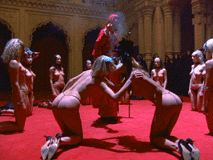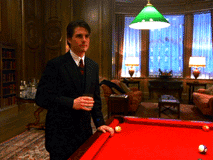Eyes Wide Shut (Stanley Kubrick) 1999
 An unfortunate victim of marketing hype, Kubrick's final film is also one of
his best, despite popular opinion and critical consensuses. Eyes Wide Shut
is an explosive examination of the struggle in a relationship between carnal
desires and desires of emotional companionship. The film suggests that it's a
near impossibility to achieve both without a considerable amount of work. It
suggests marriage is a constant struggle to balance the two.
An unfortunate victim of marketing hype, Kubrick's final film is also one of
his best, despite popular opinion and critical consensuses. Eyes Wide Shut
is an explosive examination of the struggle in a relationship between carnal
desires and desires of emotional companionship. The film suggests that it's a
near impossibility to achieve both without a considerable amount of work. It
suggests marriage is a constant struggle to balance the two.
 In the film's opening shot Kidman's character is seen from the back as she
sheds her dress. This begins a big theme in the film that equates the face with
the companionship side of a relationship, and the back or the masked face with
the carnal desires. This is the most obvious symbol used throughout the film,
and it would be exceptionally difficult to read the film without realizing it.
Most people who criticize the film (both professional and armchair critics)
don't seem to note this, however. A
lot of the film's prerelease hype dealt with the film's sexual content and it's
recreation of New York City on a London soundstage. It seems as if most responses to
the film address these points, when the film's really about neither. The film
isn't about sex. It's about emotions that create and destroy relationships. Any
mature individual should realize there's a huge difference between the two. The
film isn't about New York City either. The incorrect period details that appeared to
some to be technical gaffes are inconsequential, and in some ways add to the
feeling that the film's journey should not be taken on a literal level anyway.
In the film's opening shot Kidman's character is seen from the back as she
sheds her dress. This begins a big theme in the film that equates the face with
the companionship side of a relationship, and the back or the masked face with
the carnal desires. This is the most obvious symbol used throughout the film,
and it would be exceptionally difficult to read the film without realizing it.
Most people who criticize the film (both professional and armchair critics)
don't seem to note this, however. A
lot of the film's prerelease hype dealt with the film's sexual content and it's
recreation of New York City on a London soundstage. It seems as if most responses to
the film address these points, when the film's really about neither. The film
isn't about sex. It's about emotions that create and destroy relationships. Any
mature individual should realize there's a huge difference between the two. The
film isn't about New York City either. The incorrect period details that appeared to
some to be technical gaffes are inconsequential, and in some ways add to the
feeling that the film's journey should not be taken on a literal level anyway.
 The film's based on "Traumanovelle" (Dream Novel) by Schnitzler and
there's a real sense in the film that the dream that Alice (Nicole Kidman)
describes near the film's end is as relevant as the "real" journey
taken by the main character Bill (Tom Cruise). It's interesting that the film,
through the use of a mask that Alice apparently finds, and through the
description of her dream closely mirroring Bill's journey, suggests both
characters desires are the same. The film was derided for being prudish in its
display of sexuality, but I cannot think of many other American films that have
been brave enough to allow a woman to be a man's sexual equal without turning
her into a cartoon of some sort. The film recognizes the difference between sex
and sexuality, a distinction that is not as widely held by American filmmakers.
The film's based on "Traumanovelle" (Dream Novel) by Schnitzler and
there's a real sense in the film that the dream that Alice (Nicole Kidman)
describes near the film's end is as relevant as the "real" journey
taken by the main character Bill (Tom Cruise). It's interesting that the film,
through the use of a mask that Alice apparently finds, and through the
description of her dream closely mirroring Bill's journey, suggests both
characters desires are the same. The film was derided for being prudish in its
display of sexuality, but I cannot think of many other American films that have
been brave enough to allow a woman to be a man's sexual equal without turning
her into a cartoon of some sort. The film recognizes the difference between sex
and sexuality, a distinction that is not as widely held by American filmmakers.
 Above all, this is a truly adult film. Sexual and emotional fulfillment are
both important in a relationship. This film manages to take that thesis and
explore it in truly provocative ways. To suggest it's a failure is to probably
to suggest you were searching in it for something that it doesn't attempt to
give. Few films manage to be as psychologically complex as this one. I haven't
even mentioned the exceptional performances by Kidman and Cruise, the
unparalleled lighting, or the many nuances in emotions that cause the film to go
farther than just about any film on the subject, but I think it goes without
saying that I would recommend this film. It's one of the few true masterpieces
of the 90's, even if it took me a third viewing to realize just how phenomenal
it was.
Above all, this is a truly adult film. Sexual and emotional fulfillment are
both important in a relationship. This film manages to take that thesis and
explore it in truly provocative ways. To suggest it's a failure is to probably
to suggest you were searching in it for something that it doesn't attempt to
give. Few films manage to be as psychologically complex as this one. I haven't
even mentioned the exceptional performances by Kidman and Cruise, the
unparalleled lighting, or the many nuances in emotions that cause the film to go
farther than just about any film on the subject, but I think it goes without
saying that I would recommend this film. It's one of the few true masterpieces
of the 90's, even if it took me a third viewing to realize just how phenomenal
it was.
**** Masterpiece
October, 2001
Jeremy Heilman